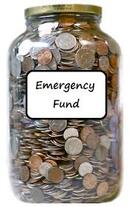Why You Should Have An Emergency Fund By Pierre Mouchette | Bits-n-Pieces We have all faced financial emergencies! But, if you do not have money to cover their cost, it could place you in a serious financial situation. Building up an emergency fund will help you move through the crunch and avoid debt.
What Is An Emergency Fund? An emergency fund is a savings account set aside expressly for unexpected expenses. It provides a buffer so that you will not have to:
What Type Of Emergencies Does An Emergency Fund Help? Random financial mishaps can happen at any time. Here are some of the sudden setbacks that an emergency fund can help with:
How Much Money Should Be In An Emergency Fund? Experts recommend saving 3 to 6 months' worth of expenses to protect you if you suddenly lose your job. Consider starting small if that amount seems too far out of your reach. A good starting point is to look back at the last 6 to 12 months and add up all unexpected expenses. It will help you set a savings goal and determine how much of each paycheck to set aside. Still not sure? Consider an initial goal of $500. That amount will help you cover expenses such as replacing a brake hose or repairing a small appliance. Once you save $500, you can set a new goal, such as $750 or $1,000. Continue adding to your fund until you have saved up enough for a month's living expenses, then go from there. How Do I Build My Emergency Fund? Building your emergency fund depends on several factors, such as your income and ability to live below your means. The most crucial step is getting started and forming a savings habit. The more consistent you are in stashing money away, the easier it will be to grow your emergency fund. But even if you cannot put much money away every month, any amount will get you closer to your goal. Some techniques for building up your fund include: Setting a monthly savings goal. Once you figure out the total amount you need, set aside a specific dollar amount or a percentage every payday. One common approach is the 50/30/20 budget, were out of each paycheck:
Where Do I Put My Emergency Fund? A dedicated savings account at a bank or credit union is the best place to put your emergency fund. You might want to open an account at a financial institution other than the one with the accounts you use for daily expenses. It will help you avoid spending your emergency funds on nonemergencies. Make sure your emergency fund is easy to access immediately. It means keeping it in a savings or money market account rather than a certificate of deposit (CD), stocks and bonds, or real estate. That way, in a crunch, you have access to your funds without needing to conduct any business first. When Should I Use My Emergency Fund? Establishing guidelines for when you can use your emergency fund is important. Use it only for unplanned expenses you cannot cover with your regular paycheck. It might include unexpected crises such as:
0 Comments
Your comment will be posted after it is approved.
Leave a Reply. |
Archives
May 2024
|
